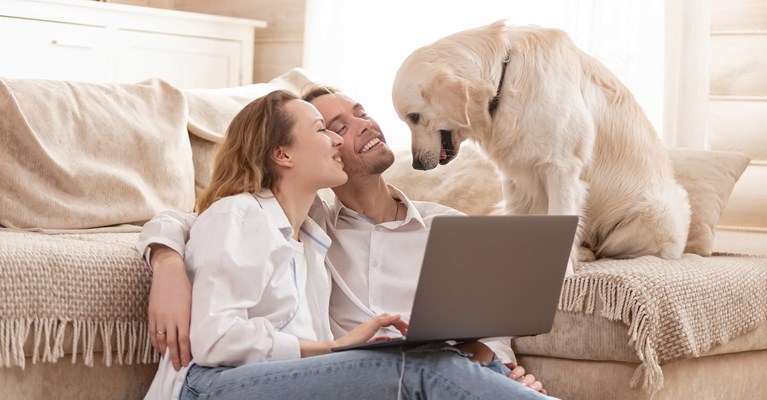Pet Insurance
Keep your furry friends happy with Asda Pet Insurance.
- Lifetime or Time Limited policy options
- 10% multi-pet discount*
- 24/7 access to vets via our video call service
Welcome to our hub of pet insurance guides, designed to help you make informed decisions for your pet's health and well-being. Learn about popular pet insurance policy types and the costs of insuring and looking after your pet.

System.Web.HttpException (0x80004005): Error executing child request for handler 'System.Web.Mvc.HttpHandlerUtil+ServerExecuteHttpHandlerAsyncWrapper'. ---> System.NullReferenceException: Object reference not set to an instance of an object. at Umbraco.Web.PublishedContentExtensions.Url(IPublishedContent content, String culture, UrlMode mode) at AsdaMoney.Features.Blocks.SecondaryLinksBlock.SecondaryLinksBlockBuilder.<>c.<GetSecondaryItems>b__10_0(NestedContentSecondaryLinkItem secondaryItem) in D:\a\1\s\src\Features\AsdaMoney.Features\Blocks\SecondaryLinksBlock\SecondaryLinksBlockBuilder.cs:line 45 at System.Linq.Enumerable.WhereSelectListIterator`2.MoveNext() at System.Collections.Generic.List`1..ctor(IEnumerable`1 collection) at System.Linq.Enumerable.ToList[TSource](IEnumerable`1 source) at AsdaMoney.Features.Blocks.SecondaryLinksBlock.SecondaryLinksBlockBuilder.Build() in D:\a\1\s\src\Features\AsdaMoney.Features\Blocks\SecondaryLinksBlock\SecondaryLinksBlockBuilder.cs:line 30 at AsdaMoney.Features.Blocks.SecondaryLinksBlock.SecondaryLinksBlockSurfaceController.SecondaryLinksBlock() in D:\a\1\s\src\Features\AsdaMoney.Features\Blocks\SecondaryLinksBlock\SecondaryLinksBlockSurfaceController.cs:line 32 at lambda_method(Closure , ControllerBase , Object[] ) at System.Web.Mvc.ActionMethodDispatcher.Execute(ControllerBase controller, Object[] parameters) at System.Web.Mvc.ReflectedActionDescriptor.Execute(ControllerContext controllerContext, IDictionary`2 parameters) at System.Web.Mvc.ControllerActionInvoker.InvokeActionMethod(ControllerContext controllerContext, ActionDescriptor actionDescriptor, IDictionary`2 parameters) at System.Web.Mvc.Async.AsyncControllerActionInvoker.<>c.<BeginInvokeSynchronousActionMethod>b__9_0(IAsyncResult asyncResult, ActionInvocation innerInvokeState) at System.Web.Mvc.Async.AsyncResultWrapper.WrappedAsyncResult`2.CallEndDelegate(IAsyncResult asyncResult) at System.Web.Mvc.Async.AsyncResultWrapper.WrappedAsyncResultBase`1.End() at System.Web.Mvc.Async.AsyncControllerActionInvoker.EndInvokeActionMethod(IAsyncResult asyncResult) at System.Web.Mvc.Async.AsyncControllerActionInvoker.AsyncInvocationWithFilters.<>c__DisplayClass11_0.<InvokeActionMethodFilterAsynchronouslyRecursive>b__0() at System.Web.Mvc.Async.AsyncControllerActionInvoker.AsyncInvocationWithFilters.<>c__DisplayClass11_2.<InvokeActionMethodFilterAsynchronouslyRecursive>b__2() at System.Web.Mvc.Async.AsyncControllerActionInvoker.AsyncInvocationWithFilters.<>c__DisplayClass11_2.<InvokeActionMethodFilterAsynchronouslyRecursive>b__2() at System.Web.Mvc.Async.AsyncControllerActionInvoker.AsyncInvocationWithFilters.<>c__DisplayClass11_2.<InvokeActionMethodFilterAsynchronouslyRecursive>b__2() at System.Web.Mvc.Async.AsyncControllerActionInvoker.AsyncInvocationWithFilters.<>c__DisplayClass11_2.<InvokeActionMethodFilterAsynchronouslyRecursive>b__2() at System.Web.Mvc.Async.AsyncControllerActionInvoker.AsyncInvocationWithFilters.<>c__DisplayClass11_2.<InvokeActionMethodFilterAsynchronouslyRecursive>b__2() at System.Web.Mvc.Async.AsyncControllerActionInvoker.AsyncInvocationWithFilters.<>c__DisplayClass11_2.<InvokeActionMethodFilterAsynchronouslyRecursive>b__2() at System.Web.Mvc.Async.AsyncControllerActionInvoker.<>c__DisplayClass7_0.<BeginInvokeActionMethodWithFilters>b__1(IAsyncResult asyncResult) at System.Web.Mvc.Async.AsyncResultWrapper.WrappedAsyncResult`1.CallEndDelegate(IAsyncResult asyncResult) at System.Web.Mvc.Async.AsyncResultWrapper.WrappedAsyncResultBase`1.End() at System.Web.Mvc.Async.AsyncControllerActionInvoker.EndInvokeActionMethodWithFilters(IAsyncResult asyncResult) at System.Web.Mvc.Async.AsyncControllerActionInvoker.<>c__DisplayClass3_6.<BeginInvokeAction>b__4() at System.Web.Mvc.Async.AsyncControllerActionInvoker.<>c__DisplayClass3_1.<BeginInvokeAction>b__1(IAsyncResult asyncResult) at System.Web.Mvc.Async.AsyncResultWrapper.WrappedAsyncResult`1.CallEndDelegate(IAsyncResult asyncResult) at System.Web.Mvc.Async.AsyncResultWrapper.WrappedAsyncResultBase`1.End() at System.Web.Mvc.Async.AsyncControllerActionInvoker.EndInvokeAction(IAsyncResult asyncResult) at System.Web.Mvc.Controller.<>c.<BeginExecuteCore>b__152_1(IAsyncResult asyncResult, ExecuteCoreState innerState) at System.Web.Mvc.Async.AsyncResultWrapper.WrappedAsyncVoid`1.CallEndDelegate(IAsyncResult asyncResult) at System.Web.Mvc.Async.AsyncResultWrapper.WrappedAsyncResultBase`1.End() at System.Web.Mvc.Controller.EndExecuteCore(IAsyncResult asyncResult) at System.Web.Mvc.Controller.<>c.<BeginExecute>b__151_2(IAsyncResult asyncResult, Controller controller) at System.Web.Mvc.Async.AsyncResultWrapper.WrappedAsyncVoid`1.CallEndDelegate(IAsyncResult asyncResult) at System.Web.Mvc.Async.AsyncResultWrapper.WrappedAsyncResultBase`1.End() at System.Web.Mvc.Controller.EndExecute(IAsyncResult asyncResult) at System.Web.Mvc.Controller.System.Web.Mvc.Async.IAsyncController.EndExecute(IAsyncResult asyncResult) at System.Web.Mvc.MvcHandler.<>c.<BeginProcessRequest>b__20_1(IAsyncResult asyncResult, ProcessRequestState innerState) at System.Web.Mvc.Async.AsyncResultWrapper.WrappedAsyncVoid`1.CallEndDelegate(IAsyncResult asyncResult) at System.Web.Mvc.Async.AsyncResultWrapper.WrappedAsyncResultBase`1.End() at System.Web.Mvc.MvcHandler.EndProcessRequest(IAsyncResult asyncResult) at System.Web.Mvc.MvcHandler.System.Web.IHttpAsyncHandler.EndProcessRequest(IAsyncResult result) at System.Web.Mvc.HttpHandlerUtil.ServerExecuteHttpHandlerAsyncWrapper.<>c__DisplayClass3_0.<EndProcessRequest>b__0() at System.Web.Mvc.HttpHandlerUtil.ServerExecuteHttpHandlerWrapper.<>c__DisplayClass5_0.<Wrap>b__0() at System.Web.Mvc.HttpHandlerUtil.ServerExecuteHttpHandlerWrapper.Wrap[TResult](Func`1 func) at System.Web.Mvc.HttpHandlerUtil.ServerExecuteHttpHandlerWrapper.Wrap(Action action) at System.Web.Mvc.HttpHandlerUtil.ServerExecuteHttpHandlerAsyncWrapper.EndProcessRequest(IAsyncResult result) at System.Web.HttpServerUtility.ExecuteInternal(IHttpHandler handler, TextWriter writer, Boolean preserveForm, Boolean setPreviousPage, VirtualPath path, VirtualPath filePath, String physPath, Exception error, String queryStringOverride) at System.Web.HttpServerUtility.ExecuteInternal(IHttpHandler handler, TextWriter writer, Boolean preserveForm, Boolean setPreviousPage, VirtualPath path, VirtualPath filePath, String physPath, Exception error, String queryStringOverride) at System.Web.HttpServerUtility.Execute(IHttpHandler handler, TextWriter writer, Boolean preserveForm, Boolean setPreviousPage) at System.Web.HttpServerUtility.Execute(IHttpHandler handler, TextWriter writer, Boolean preserveForm) at System.Web.HttpServerUtilityWrapper.Execute(IHttpHandler handler, TextWriter writer, Boolean preserveForm) at System.Web.Mvc.Html.ChildActionExtensions.ActionHelper(HtmlHelper htmlHelper, String actionName, String controllerName, RouteValueDictionary routeValues, TextWriter textWriter) at System.Web.Mvc.Html.ChildActionExtensions.Action(HtmlHelper htmlHelper, String actionName, String controllerName, RouteValueDictionary routeValues) at Our.Umbraco.DocTypeGridEditor.Web.Extensions.HtmlHelperExtensions.RenderDocTypeGridEditorItem(HtmlHelper helper, IPublishedElement content, String editorAlias, String viewPath, String previewViewPath, Boolean isPreview) at ASP._Page_app_plugins_doctypegrideditor_render_DocTypeGridEditor_cshtml.Execute() at System.Web.WebPages.WebPageBase.ExecutePageHierarchy() at System.Web.Mvc.WebViewPage.ExecutePageHierarchy() at System.Web.WebPages.WebPageBase.ExecutePageHierarchy(WebPageContext pageContext, TextWriter writer, WebPageRenderingBase startPage) at System.Web.Mvc.RazorView.RenderView(ViewContext viewContext, TextWriter writer, Object instance) at System.Web.Mvc.BuildManagerCompiledView.Render(ViewContext viewContext, TextWriter writer) at Umbraco.Web.Mvc.ProfilingView.Render(ViewContext viewContext, TextWriter writer) at System.Web.Mvc.HtmlHelper.RenderPartialInternal(String partialViewName, ViewDataDictionary viewData, Object model, TextWriter writer, ViewEngineCollection viewEngineCollection) at System.Web.Mvc.Html.PartialExtensions.Partial(HtmlHelper htmlHelper, String partialViewName, Object model, ViewDataDictionary viewData) at System.Web.Mvc.Html.PartialExtensions.Partial(HtmlHelper htmlHelper, String partialViewName, Object model) at ASP._Page_Views_Partials_grid_editors_Base_cshtml.Execute()
System.Web.HttpException (0x80004005): Error executing child request for handler 'System.Web.Mvc.HttpHandlerUtil+ServerExecuteHttpHandlerAsyncWrapper'. ---> System.NullReferenceException: Object reference not set to an instance of an object. at Umbraco.Web.PublishedContentExtensions.Url(IPublishedContent content, String culture, UrlMode mode) at AsdaMoney.Features.Blocks.SecondaryLinksBlock.SecondaryLinksBlockBuilder.<>c.<GetSecondaryItems>b__10_0(NestedContentSecondaryLinkItem secondaryItem) in D:\a\1\s\src\Features\AsdaMoney.Features\Blocks\SecondaryLinksBlock\SecondaryLinksBlockBuilder.cs:line 45 at System.Linq.Enumerable.WhereSelectListIterator`2.MoveNext() at System.Collections.Generic.List`1..ctor(IEnumerable`1 collection) at System.Linq.Enumerable.ToList[TSource](IEnumerable`1 source) at AsdaMoney.Features.Blocks.SecondaryLinksBlock.SecondaryLinksBlockBuilder.Build() in D:\a\1\s\src\Features\AsdaMoney.Features\Blocks\SecondaryLinksBlock\SecondaryLinksBlockBuilder.cs:line 30 at AsdaMoney.Features.Blocks.SecondaryLinksBlock.SecondaryLinksBlockSurfaceController.SecondaryLinksBlock() in D:\a\1\s\src\Features\AsdaMoney.Features\Blocks\SecondaryLinksBlock\SecondaryLinksBlockSurfaceController.cs:line 32 at lambda_method(Closure , ControllerBase , Object[] ) at System.Web.Mvc.ActionMethodDispatcher.Execute(ControllerBase controller, Object[] parameters) at System.Web.Mvc.ReflectedActionDescriptor.Execute(ControllerContext controllerContext, IDictionary`2 parameters) at System.Web.Mvc.ControllerActionInvoker.InvokeActionMethod(ControllerContext controllerContext, ActionDescriptor actionDescriptor, IDictionary`2 parameters) at System.Web.Mvc.Async.AsyncControllerActionInvoker.<>c.<BeginInvokeSynchronousActionMethod>b__9_0(IAsyncResult asyncResult, ActionInvocation innerInvokeState) at System.Web.Mvc.Async.AsyncResultWrapper.WrappedAsyncResult`2.CallEndDelegate(IAsyncResult asyncResult) at System.Web.Mvc.Async.AsyncResultWrapper.WrappedAsyncResultBase`1.End() at System.Web.Mvc.Async.AsyncControllerActionInvoker.EndInvokeActionMethod(IAsyncResult asyncResult) at System.Web.Mvc.Async.AsyncControllerActionInvoker.AsyncInvocationWithFilters.<>c__DisplayClass11_0.<InvokeActionMethodFilterAsynchronouslyRecursive>b__0() at System.Web.Mvc.Async.AsyncControllerActionInvoker.AsyncInvocationWithFilters.<>c__DisplayClass11_2.<InvokeActionMethodFilterAsynchronouslyRecursive>b__2() at System.Web.Mvc.Async.AsyncControllerActionInvoker.AsyncInvocationWithFilters.<>c__DisplayClass11_2.<InvokeActionMethodFilterAsynchronouslyRecursive>b__2() at System.Web.Mvc.Async.AsyncControllerActionInvoker.AsyncInvocationWithFilters.<>c__DisplayClass11_2.<InvokeActionMethodFilterAsynchronouslyRecursive>b__2() at System.Web.Mvc.Async.AsyncControllerActionInvoker.AsyncInvocationWithFilters.<>c__DisplayClass11_2.<InvokeActionMethodFilterAsynchronouslyRecursive>b__2() at System.Web.Mvc.Async.AsyncControllerActionInvoker.AsyncInvocationWithFilters.<>c__DisplayClass11_2.<InvokeActionMethodFilterAsynchronouslyRecursive>b__2() at System.Web.Mvc.Async.AsyncControllerActionInvoker.AsyncInvocationWithFilters.<>c__DisplayClass11_2.<InvokeActionMethodFilterAsynchronouslyRecursive>b__2() at System.Web.Mvc.Async.AsyncControllerActionInvoker.<>c__DisplayClass7_0.<BeginInvokeActionMethodWithFilters>b__1(IAsyncResult asyncResult) at System.Web.Mvc.Async.AsyncResultWrapper.WrappedAsyncResult`1.CallEndDelegate(IAsyncResult asyncResult) at System.Web.Mvc.Async.AsyncResultWrapper.WrappedAsyncResultBase`1.End() at System.Web.Mvc.Async.AsyncControllerActionInvoker.EndInvokeActionMethodWithFilters(IAsyncResult asyncResult) at System.Web.Mvc.Async.AsyncControllerActionInvoker.<>c__DisplayClass3_6.<BeginInvokeAction>b__4() at System.Web.Mvc.Async.AsyncControllerActionInvoker.<>c__DisplayClass3_1.<BeginInvokeAction>b__1(IAsyncResult asyncResult) at System.Web.Mvc.Async.AsyncResultWrapper.WrappedAsyncResult`1.CallEndDelegate(IAsyncResult asyncResult) at System.Web.Mvc.Async.AsyncResultWrapper.WrappedAsyncResultBase`1.End() at System.Web.Mvc.Async.AsyncControllerActionInvoker.EndInvokeAction(IAsyncResult asyncResult) at System.Web.Mvc.Controller.<>c.<BeginExecuteCore>b__152_1(IAsyncResult asyncResult, ExecuteCoreState innerState) at System.Web.Mvc.Async.AsyncResultWrapper.WrappedAsyncVoid`1.CallEndDelegate(IAsyncResult asyncResult) at System.Web.Mvc.Async.AsyncResultWrapper.WrappedAsyncResultBase`1.End() at System.Web.Mvc.Controller.EndExecuteCore(IAsyncResult asyncResult) at System.Web.Mvc.Controller.<>c.<BeginExecute>b__151_2(IAsyncResult asyncResult, Controller controller) at System.Web.Mvc.Async.AsyncResultWrapper.WrappedAsyncVoid`1.CallEndDelegate(IAsyncResult asyncResult) at System.Web.Mvc.Async.AsyncResultWrapper.WrappedAsyncResultBase`1.End() at System.Web.Mvc.Controller.EndExecute(IAsyncResult asyncResult) at System.Web.Mvc.Controller.System.Web.Mvc.Async.IAsyncController.EndExecute(IAsyncResult asyncResult) at System.Web.Mvc.MvcHandler.<>c.<BeginProcessRequest>b__20_1(IAsyncResult asyncResult, ProcessRequestState innerState) at System.Web.Mvc.Async.AsyncResultWrapper.WrappedAsyncVoid`1.CallEndDelegate(IAsyncResult asyncResult) at System.Web.Mvc.Async.AsyncResultWrapper.WrappedAsyncResultBase`1.End() at System.Web.Mvc.MvcHandler.EndProcessRequest(IAsyncResult asyncResult) at System.Web.Mvc.MvcHandler.System.Web.IHttpAsyncHandler.EndProcessRequest(IAsyncResult result) at System.Web.Mvc.HttpHandlerUtil.ServerExecuteHttpHandlerAsyncWrapper.<>c__DisplayClass3_0.<EndProcessRequest>b__0() at System.Web.Mvc.HttpHandlerUtil.ServerExecuteHttpHandlerWrapper.<>c__DisplayClass5_0.<Wrap>b__0() at System.Web.Mvc.HttpHandlerUtil.ServerExecuteHttpHandlerWrapper.Wrap[TResult](Func`1 func) at System.Web.Mvc.HttpHandlerUtil.ServerExecuteHttpHandlerWrapper.Wrap(Action action) at System.Web.Mvc.HttpHandlerUtil.ServerExecuteHttpHandlerAsyncWrapper.EndProcessRequest(IAsyncResult result) at System.Web.HttpServerUtility.ExecuteInternal(IHttpHandler handler, TextWriter writer, Boolean preserveForm, Boolean setPreviousPage, VirtualPath path, VirtualPath filePath, String physPath, Exception error, String queryStringOverride) at System.Web.HttpServerUtility.ExecuteInternal(IHttpHandler handler, TextWriter writer, Boolean preserveForm, Boolean setPreviousPage, VirtualPath path, VirtualPath filePath, String physPath, Exception error, String queryStringOverride) at System.Web.HttpServerUtility.Execute(IHttpHandler handler, TextWriter writer, Boolean preserveForm, Boolean setPreviousPage) at System.Web.HttpServerUtility.Execute(IHttpHandler handler, TextWriter writer, Boolean preserveForm) at System.Web.HttpServerUtilityWrapper.Execute(IHttpHandler handler, TextWriter writer, Boolean preserveForm) at System.Web.Mvc.Html.ChildActionExtensions.ActionHelper(HtmlHelper htmlHelper, String actionName, String controllerName, RouteValueDictionary routeValues, TextWriter textWriter) at System.Web.Mvc.Html.ChildActionExtensions.Action(HtmlHelper htmlHelper, String actionName, String controllerName, RouteValueDictionary routeValues) at Our.Umbraco.DocTypeGridEditor.Web.Extensions.HtmlHelperExtensions.RenderDocTypeGridEditorItem(HtmlHelper helper, IPublishedElement content, String editorAlias, String viewPath, String previewViewPath, Boolean isPreview) at ASP._Page_app_plugins_doctypegrideditor_render_DocTypeGridEditor_cshtml.Execute() at System.Web.WebPages.WebPageBase.ExecutePageHierarchy() at System.Web.Mvc.WebViewPage.ExecutePageHierarchy() at System.Web.WebPages.WebPageBase.ExecutePageHierarchy(WebPageContext pageContext, TextWriter writer, WebPageRenderingBase startPage) at System.Web.Mvc.RazorView.RenderView(ViewContext viewContext, TextWriter writer, Object instance) at System.Web.Mvc.BuildManagerCompiledView.Render(ViewContext viewContext, TextWriter writer) at Umbraco.Web.Mvc.ProfilingView.Render(ViewContext viewContext, TextWriter writer) at System.Web.Mvc.HtmlHelper.RenderPartialInternal(String partialViewName, ViewDataDictionary viewData, Object model, TextWriter writer, ViewEngineCollection viewEngineCollection) at System.Web.Mvc.Html.PartialExtensions.Partial(HtmlHelper htmlHelper, String partialViewName, Object model, ViewDataDictionary viewData) at System.Web.Mvc.Html.PartialExtensions.Partial(HtmlHelper htmlHelper, String partialViewName, Object model) at ASP._Page_Views_Partials_grid_editors_Base_cshtml.Execute()